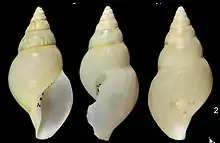Xanthodaphne argeta
Xanthodaphne argeta is a species of sea snail, a marine gastropod mollusk in the family Raphitomidae.[1]
| Xanthodaphne argeta | |
|---|---|
 | |
| Shell of Xanthodaphne argeta (holotype at the Smithsonian Institution) | |
| Scientific classification | |
| Kingdom: | Animalia |
| Phylum: | Mollusca |
| Class: | Gastropoda |
| Subclass: | Caenogastropoda |
| Order: | Neogastropoda |
| Superfamily: | Conoidea |
| Family: | Raphitomidae |
| Genus: | Xanthodaphne |
| Species: | X. argeta |
| Binomial name | |
| Xanthodaphne argeta ((Dall, 1890) | |
| Synonyms[1] | |
| |
Description
The length of the shell attains 43 mm, its diameter 20 mm.
(Original description) The polished shell is short-fusiform, snow white, eight- whorled. The protoconch is eroded in the specimen. The whorls are full, oppressed in front of the suture, elsewhere gently rounded. The transverse sculpture consists of delicate incremental lines. The spiral sculpture consists of obscure almost microscopic striae and a few close set extremely fine threads on the siphonal canal. The aperture is elongated. The anal notch is very shallow and rounded; leaving only a faint slightly flattened fasciole. The outer lip is sharp, simple, arched well forward, especially anteriorly. The body is without callus. The columella is thin, white, short, slightly twisted. The siphonal canal is short, very wide and hardly differentiated [2]
Distribution
This marine species was found near the Galapagos Islands at a depth of 1485 m.
References
- Xanthodaphne argeta (Dall, 1890). Retrieved through: World Register of Marine Species on 5 April 2010.
- Dall, W.H. (1890) Scientific results of explorations by the U.S. Fish Commission Steamer Albatross. No. VII – Preliminary report on the collection of Mollusca and Brachiopoda obtained in 1887–88. Proceedings of the United States National Museum, 12, 219–362, pls. 5–14
- McLean, 1971a:124, fig. 139
External links
- Tucker, J.K. (2004). "Catalog of recent and fossil turrids (Mollusca: Gastropoda)" (PDF). Zootaxa. 682: 1–1295.
| Wikimedia Commons has media related to Xanthodaphne argeta. |